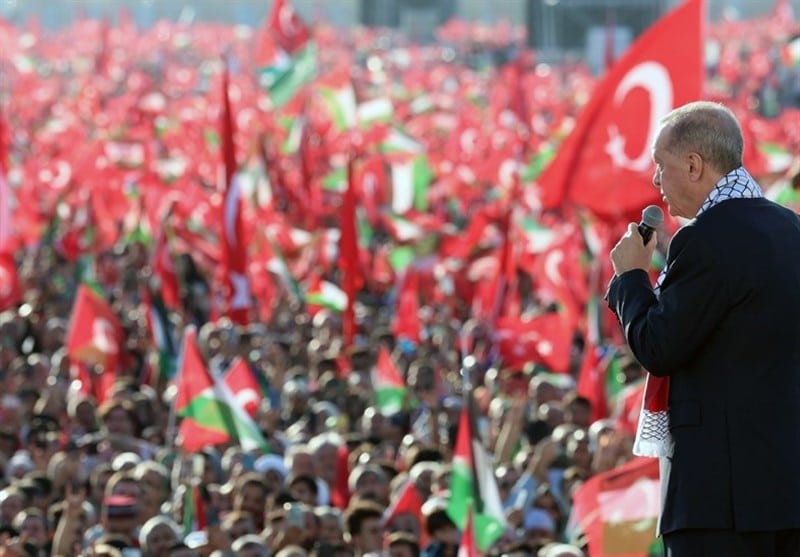Why Türkiye’s approach to the Gaza war intensified?
These days in Turkey, talk about the crimes of the Zionist regime in Gaza has subsided to a great extent, and only the news about the release of the hostages is published. Meanwhile, in the first days after October 7 and the Al-Aqsa storm operation, I witnessed another encounter.
After the surprise attack of the Palestinian militants on the Zionist regime and the destruction of the security hegemony of this regime, the Turkish government and the Justice and Development Party initially took a cautious stance and did not even seriously support Hamas and criticize Israel. But in the same days, several Turkish political parties, including the Islamist Saadat Party (students of the late Arbakan) and the Future Party (Ahmed Davutoglu), organized large-scale demonstrations and demanded the expulsion of the ambassador of the Zionist regime.
However, Erdogan came too late. Why? This is because he and Turkish Foreign Minister Hakan Fidan sought to play a special role in ending the conflict and to act as mediators and protectors of peace. However, neither the Zionist regime nor America, Europe, and Islamic countries welcomed Turkey’s proposal.
Özgur Ozel, who has recently replaced Kemal Kılıçdaroğlu as the leader of the People’s Republic Party, addressed Erdogan yesterday in his speech in the parliament: “You accuse us of indifference about Palestine. But such a thing is not true. From this platform, I invite Erdogan to come to the Gaza border with me and other leaders of Turkish parties. I ask him to join us and we all go to the Gaza border and defend the Palestinians. If Erdogan has good intentions about Palestine, we are ready to travel.”
At the same time as Özgur Özel’s words, other politicians of his party raised their criticisms of Erdogan and announced: “The banning of Nescafe and Coca-Cola is not only on the menu of the parliament, but it rubs Israel’s nose in the dirt.” If you are right, stop exporting steel. “Israel makes bombs with our steel.”
It is said that Türkiye is the most important exporter of steel to the Zionist regime.
Another criticism is that in his speeches, Erdogan constantly speaks against Benjamin Netanyahu and not about the regime. He has repeatedly announced that Netanyahu is leaving. Erdogan’s critics say, knowing that Netanyahu will lose his position in the future, he speaks against him, but does not say anything about Israel itself.
The similarity of the approach of Riyadh and Ankara
Ibrahim Kiras, a Turkish analyst, wrote in a critical article about Erdogan’s policies regarding Palestine: “The operations that Hamas carried out on October 7th were not liked or supported by anyone in the entire Arab and Islamic world, except for Iran. Not because civilians were also killed, but because everyone was lining up and trying to normalize relations with Israel. Just at such a moment, Hamas upset their table. By doing this, they reminded everyone that they should not give up on the cause of Palestine. This was a response to Arab countries’ efforts to establish relations with Israel and disregard the Palestinian issue. Some capitals in the Islamic world had previously made peace with the government of Tel Aviv separately. Sometimes they also managed to get concessions for the Palestinians. For example, in the Camp David Accords, autonomy was given to Gaza and the West Bank. However, this did not happen in the new era and when the news of the possibility of normalization of relations between Saudi Arabia and Israel came out, a group from Mahmoud Abbas went to Riyadh and asked Mohammed bin Salman to get concessions for the Palestinians before normalization. However, the Saudis did not respond to this request.

